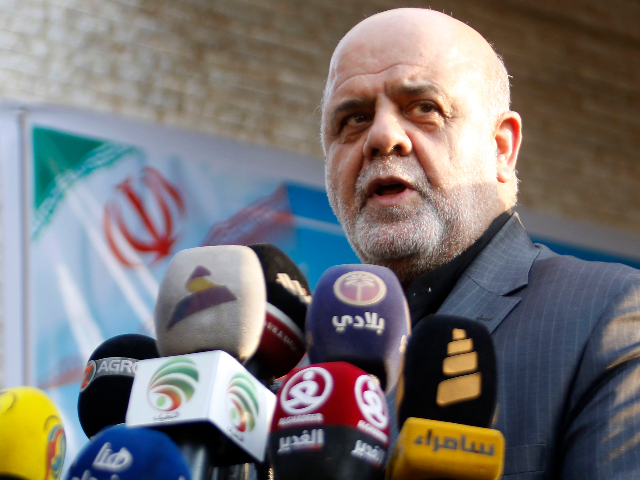The United States blacklisted Iraj Masjedi, Iran’s ambassador to Iraq, and two senior officials of the Iran-backed terrorist organization Hezbollah on Thursday.
Iran retaliated on Friday by imposing sanctions against the U.S. ambassador to Iraq, Matthew Tueller, his deputy Steve Fagin, and Rob Waller, head of the U.S. consulate in the Kurdistan capital of Erbil.
The U.S. Treasury Department said on Thursday it was sanctioning Masjedi, who holds the rank of general in the notorious Quds Force (QF) of Iran’s Islamic Revolutionary Guard Corps (IRGC), because he “directed or supported groups that are responsible for attacks that have killed and wounded U.S. and coalition forces in Iraq” during his decades of service to the IRGC, a designated terrorist organization.
More recently, Treasury said Masjedi has “exploited his position as the Iranian regime’s ambassador in Iraq to obfuscate financial transfers conducted for the benefit of the IRGC-QF.”
“The Iranian regime threatens Iraq’s security and sovereignty by appointing IRGC-QF officials as ambassadors in the region to carry out their destabilizing foreign agenda,” explained Treasury Secretary Steven Mnuchin.
“The United States will continue to employ the tools and authorities at its disposal to target the Iranian regime and IRGC-QF officials that attempt to meddle in the affairs of sovereign nations, including any attempts to influence U.S. elections,” Mnuchin said.
This was evidently a reference to the recently-uncovered Iranian plot to sow discord in the United States by sending phony threatening emails to Democrat voters. The Treasury Department also announced sanctions against the IRGC, the Quds Force, and Iran’s Bayan Rasaneh Bostar institute on Thursday for their involvement in the scheme.
The Treasury Department additionally sanctioned two members of Hezbollah’s Central Council, the organization that chooses representatives for the governing Shura Council. Both of these individuals publicly supported Hezbollah’s terrorist activities, including attacks on Americans in Iraq.
“Hezbollah’s senior leaders are responsible for creating and implementing the terrorist organization’s destabilizing and violent agenda against U.S. interests and those of our partners around the world. We must continue to hold Hizballah accountable for its horrific actions as we approach the 37th anniversary of Hezbollah’s bombing of the U.S. Marine Barracks in Beirut, Lebanon,” Mnuchin said.
Masjedi told Iranian state media he was “pleased to hear the news” that the “terrorist and criminal regime of the United States has put me once more on the list of its unjust sanctions alongside 80 million Iranians.”
Iran retaliated on Friday by imposing sanctions against Tueller, Fagin, and Waller, accusing them of “organizing, financing, leading, and committing terrorist attacks against the interest of the government or citizens” of Iran – essentially a petulant rephrasing of the Treasury statements about Masjedi and the Hezbollah officials. Unlike the Treasury announcements they were imitating, the Iranians were vague about exactly what their “sanctions” against Ambassador Tueller and the others would entail.
The Iranians accused the three U.S. officials of being involved in the January drone strike that killed IRGC-QF leader Gen. Qassem Soleimani, Masjedi’s superior. Iran called the action a “criminal assassination” and said “anti-Iran moves won’t go unanswered.”
Iran further accused the U.S. officials of supporting the Islamic State and al-Qaeda’s franchise in Syria, the Nusra Front. According to the Iranians, the U.S. killed Soleimani because he was too effective at fighting ISIS.
The Iranians conveniently forgot to mention that Soleimani was in Iraq to coordinate deadly attacks against Iraqi bases where U.S. personnel were stationed, and organize an assault on the U.S. Embassy in Baghdad, at the time of his death.

COMMENTS
Please let us know if you're having issues with commenting.